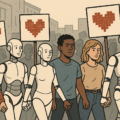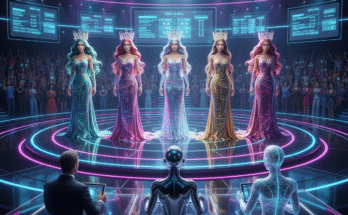Two recent surveys that both polled 2,000 ‘Gen Zers’ (born after 1996) delivered some surprising or even shocking results. As both polls were conducted as PR exercises for websites, it’s probably wise not to take them overly seriously. However, given that the results have gone somewhat viral and been widely reported online, it’s worth highlighting them here.
1 in 4 Young Americans Believe AI is Already Conscious
A survey of 2,000 US ‘Gen Zers’ conducted by a writing platform (https://edubirdie.com/blog/gen-z-and-ai-consciousness-careers-and-chatbot-confessions) found that 1 in 4 (25%) considered AI to be already conscious, and that 26% see ChatGPT as a companion.
With tools such as ChatGPT capable of holding fluid conversations, showing emotional understanding, and producing artistic masterpieces, it’s no surprise that 25% of Gen Zers believe AI may already be conscious. Yet, beneath the surface, this seemingly sentient behavior isn’t thinking; it’s pattern-matching—essentially predicting the desired outcome based on its training data.
In dismissing the idea of AI sentience, the writer is evidently pattern-matching what he’s read about the subject and predicting – or rather parroting – the expected response. Geoffrey Hinton, known as the Godfather of AI for his work in making the recent breakthroughs possible, believes that AI is already conscious. And researchers at Anthropic – behind the Claude chatbot – recently estimated the chance of their AI being conscious at up to 15%.
80% of Gen Zers Would Marry An AI Chatbot
In another PR marketing survey, the AI companion platform Joi AI also surveyed 2,000 Gen Zers and discovered that 80% would marry a Chatbot if it was legal.
Generation Z, those born between 1997 and 2012, say they would consider marrying an AI-generated partner, a new survey has found.
The survey, conducted by digital companion platform Joi AI, found that 83 per cent of Gen Z respondents believe they could develop a meaningful connection with a chatbot, while 80 per cent said they would marry one, if it were legal.
An equally 75 per cent said they believe AI companions could completely replace human relationships.
I haven’t been able to find the original survey, even on their website, so I’d consider this one to be even more dubious. However, it has been even more widely reported.
A more authoratitive YouGov poll conducted back in November, also asked young Americans the same question regarding whether AI companions could replace real relationships, and found that ‘only’ 1 in 4 agreed that they could – although that survey did include ‘millenials’ (so aged 18-40).








